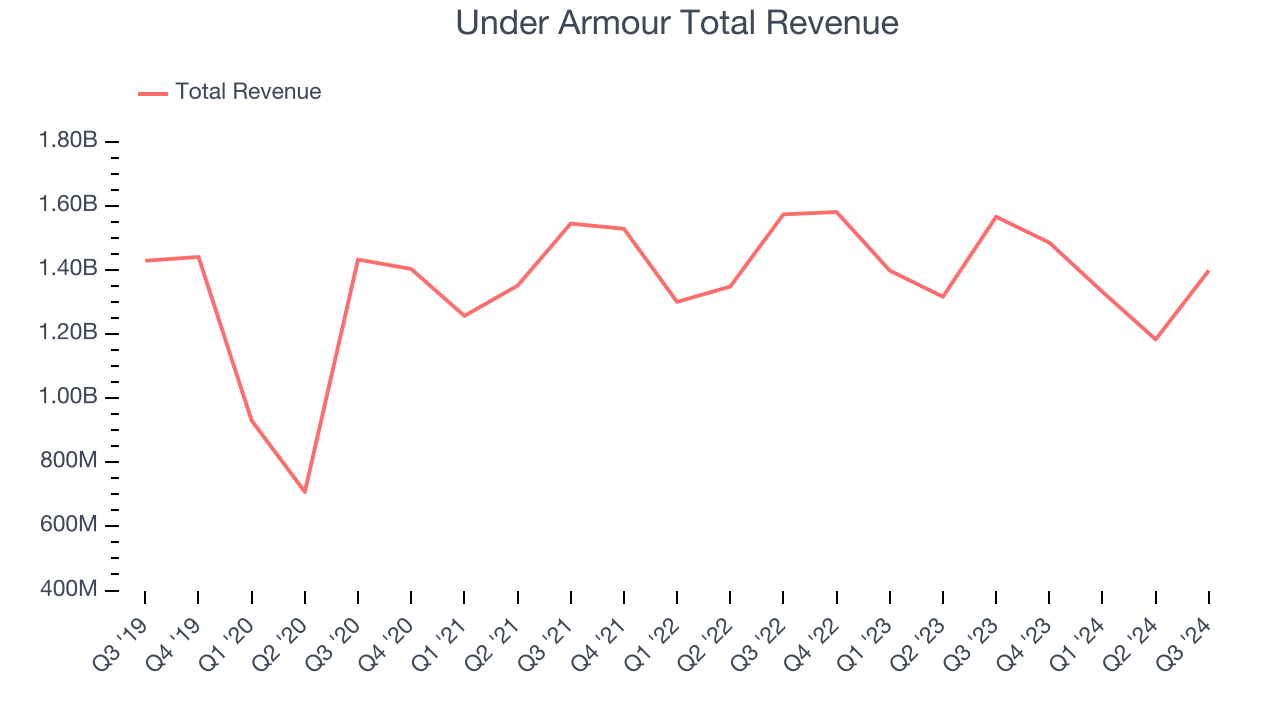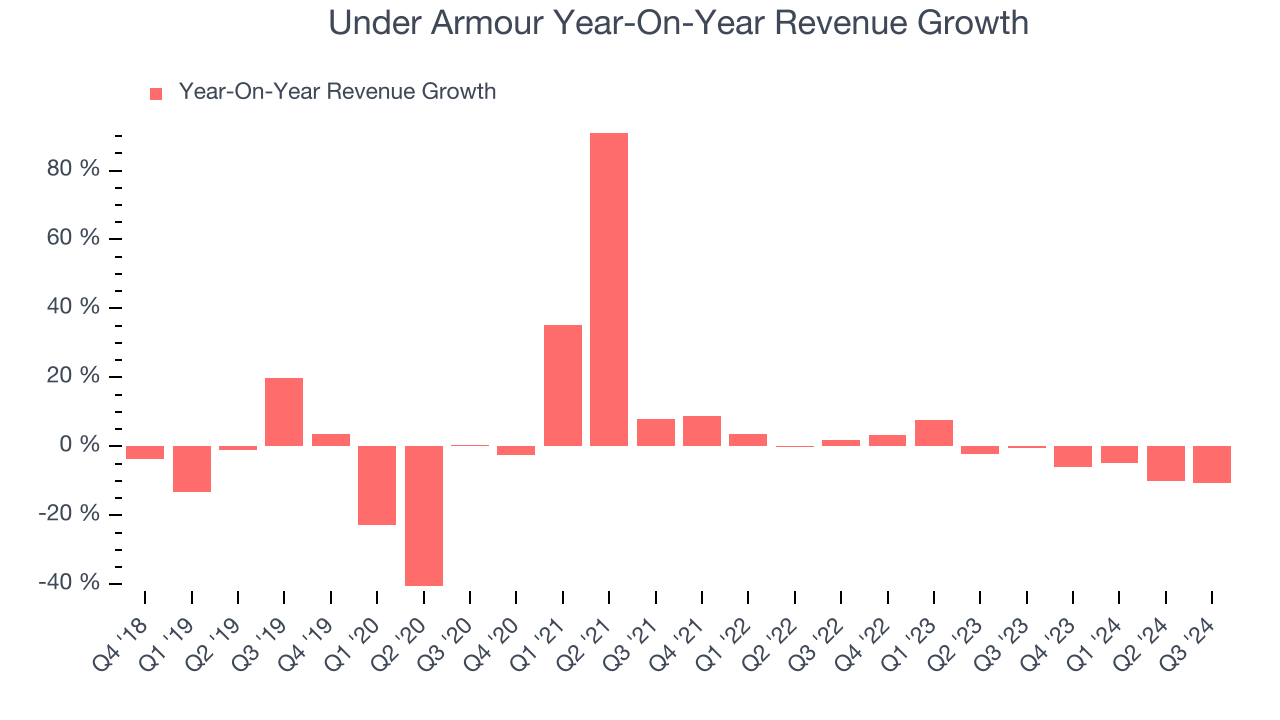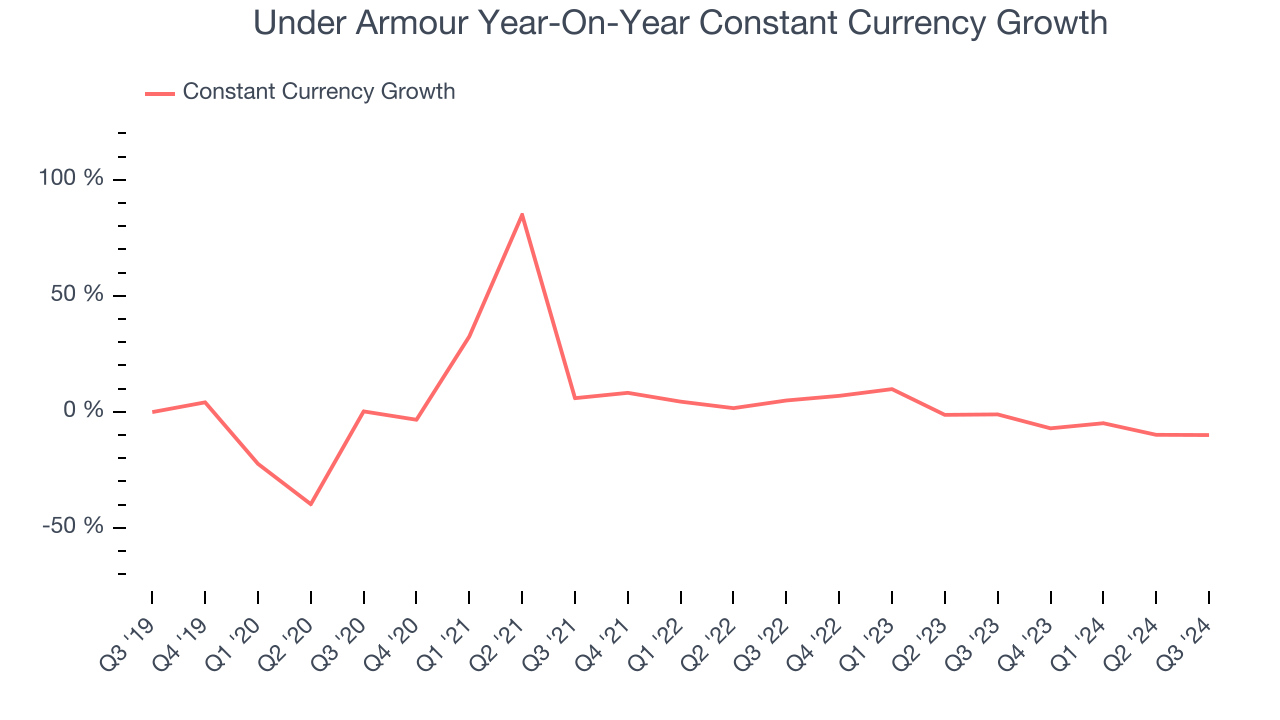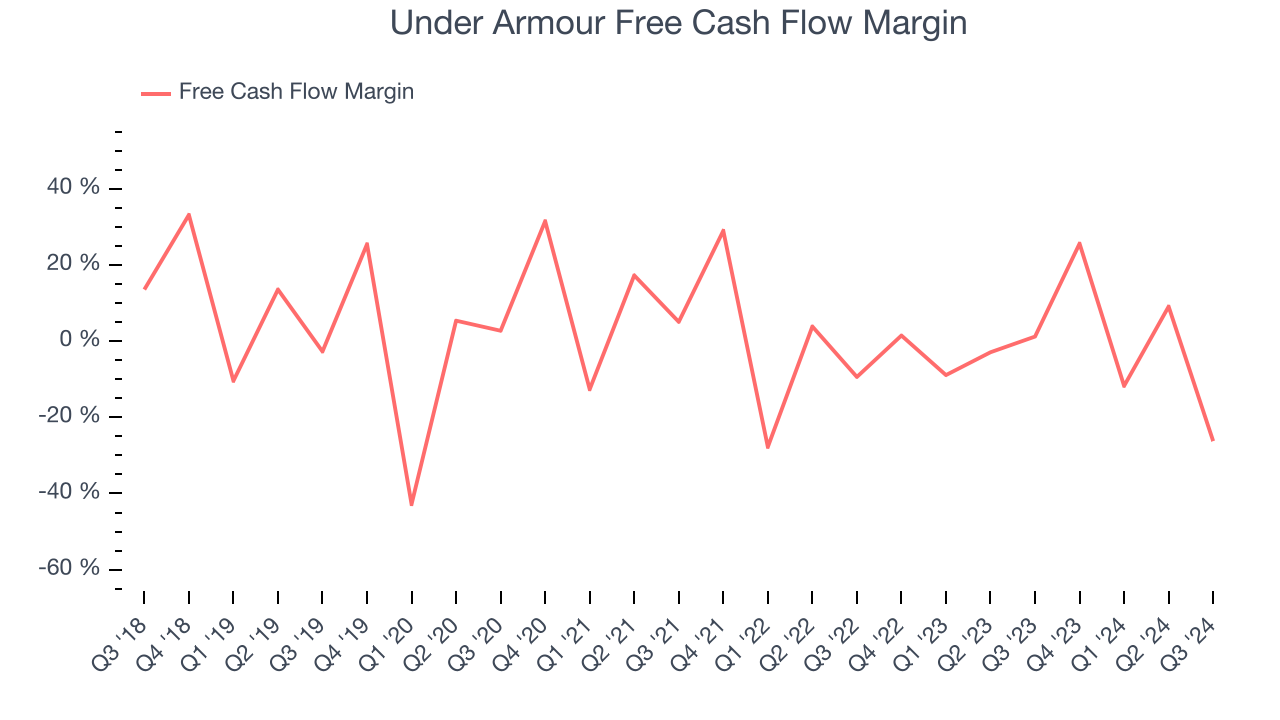
Athletic apparel company Under Armour (NYSE:UAA) announced better-than-expected revenue in Q3 CY2024, but sales fell 10.7% year on year to $1.40 billion. Its non-GAAP profit of $0.03 per share was below analysts’ consensus estimates.
Is now the time to buy Under Armour? Find out by accessing our full research report, it’s free.
Under Armour (UAA) Q3 CY2024 Highlights:
- Revenue: $1.40 billion vs analyst estimates of $1.38 billion (1.1% beat)
- Adjusted EPS: $0.03 vs analyst estimates of $0.19 (-$0.16 miss)
- EBITDA: $189.5 million vs analyst estimates of $148.7 million (27.5% beat)
- Management raised its full-year Adjusted Operating Income guidance to $175 million at the midpoint
- Gross Margin (GAAP): 49.8%, up from 48% in the same quarter last year
- Operating Margin: 12.4%, up from 9.1% in the same quarter last year
- EBITDA Margin: 13.5%, up from 11.5% in the same quarter last year
- Free Cash Flow was -$367.2 million, down from $18.66 million in the same quarter last year
- Constant Currency Revenue fell 10% year on year (-1.1% in the same quarter last year)
- Market Capitalization: $3.64 billion
Company Overview
Founded in 1996 by a former University of Maryland football player, Under Armour (NYSE:UAA) is an apparel brand specializing in sportswear designed to improve athletic performance.
Apparel, Accessories and Luxury Goods
Within apparel and accessories, not only do styles change more frequently today than decades past as fads travel through social media and the internet but consumers are also shifting the way they buy their goods, favoring omnichannel and e-commerce experiences. Some apparel, accessories, and luxury goods companies have made concerted efforts to adapt while those who are slower to move may fall behind.
Sales Growth
A company’s long-term performance is an indicator of its overall business quality. While any business can experience short-term success, top-performing ones enjoy sustained growth for multiple years. Over the last five years, Under Armour’s sales were flat. This shows demand was soft and is a tough starting point for our analysis.

We at StockStory place the most emphasis on long-term growth, but within consumer discretionary, a stretched historical view may miss a company riding a successful new product or emerging trend. Under Armour’s recent history shows its demand has stayed suppressed as its revenue has declined by 3.1% annually over the last two years. 
We can better understand the company’s sales dynamics by analyzing its constant currency revenue, which excludes currency movements that are outside their control and not indicative of demand. Over the last two years, its constant currency sales averaged 2.2% year-on-year declines. Because this number aligns with its normal revenue growth, we can see Under Armour’s foreign exchange rates have been steady. 
This quarter, Under Armour’s revenue fell 10.7% year on year to $1.40 billion but beat Wall Street’s estimates by 1.1%.
Looking ahead, sell-side analysts expect revenue to decline 5% over the next 12 months, a slight deceleration versus the last two years. This projection doesn't excite us and indicates the market thinks its products and services will see some demand headwinds.
Today’s young investors won’t have read the timeless lessons in Gorilla Game: Picking Winners In High Technology because it was written more than 20 years ago when Microsoft and Apple were first establishing their supremacy. But if we apply the same principles, then enterprise software stocks leveraging their own generative AI capabilities may well be the Gorillas of the future. So, in that spirit, we are excited to present our Special Free Report on a profitable, fast-growing enterprise software stock that is already riding the automation wave and looking to catch the generative AI next.
Cash Is King
If you’ve followed StockStory for a while, you know we emphasize free cash flow. Why, you ask? We believe that in the end, cash is king, and you can’t use accounting profits to pay the bills.
Over the last two years, Under Armour’s demanding reinvestments to stay relevant have drained its resources. Its free cash flow margin averaged negative 1.4%, meaning it lit $1.40 of cash on fire for every $100 in revenue.

Under Armour burned through $367.2 million of cash in Q3, equivalent to a negative 26.2% margin. The company’s cash flow turned negative after being positive in the same quarter last year, prompting us to pay closer attention. Short-term fluctuations typically aren’t a big deal because investment needs can be seasonal, but we’ll be watching to see if the trend extrapolates into future quarters.
Over the next year, analysts predict Under Armour’s cash conversion will improve. Their consensus estimates imply its breakeven free cash flow margin for the last 12 months will increase to 2.4%, giving it more money to invest.
Key Takeaways from Under Armour’s Q3 Results
We were impressed by how significantly Under Armour blew past analysts’ operating margin and EBITDA expectations this quarter. We were also excited it raised its full-year adjusted operating income guidance. Overall, this was a good quarter despite the EPS miss, as operating profits are more telling of business fundamentals. The stock traded up 22.2% to $10.70 immediately following the results.
So do we think Under Armour is an attractive buy at the current price? If you’re making that decision, you should consider the bigger picture of valuation, business qualities, as well as the latest earnings. We cover that in our actionable full research report which you can read here, it’s free.
